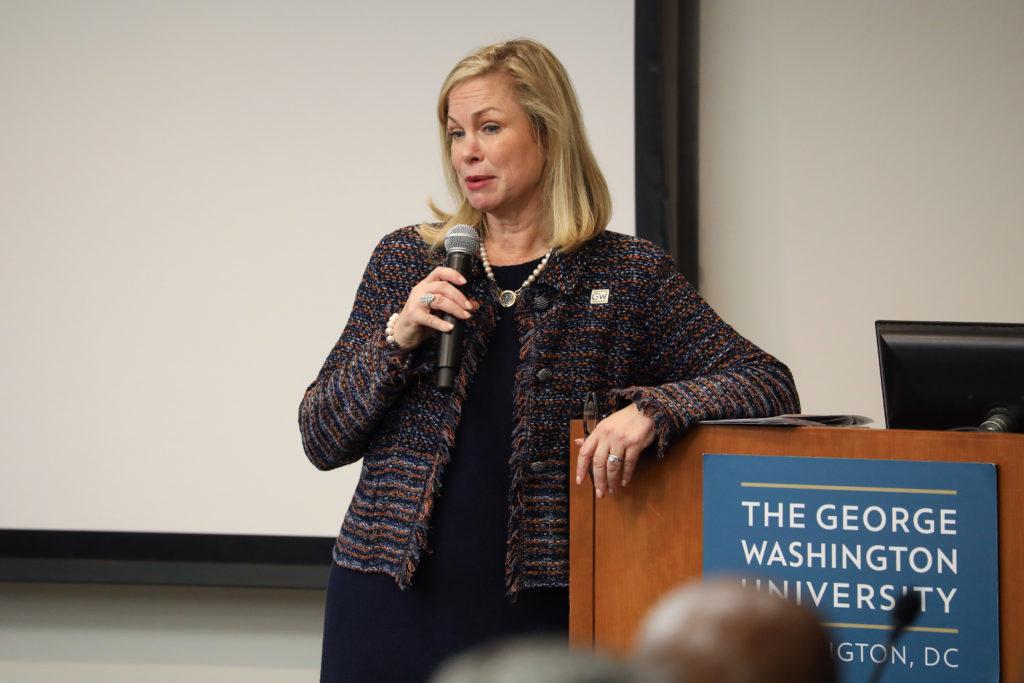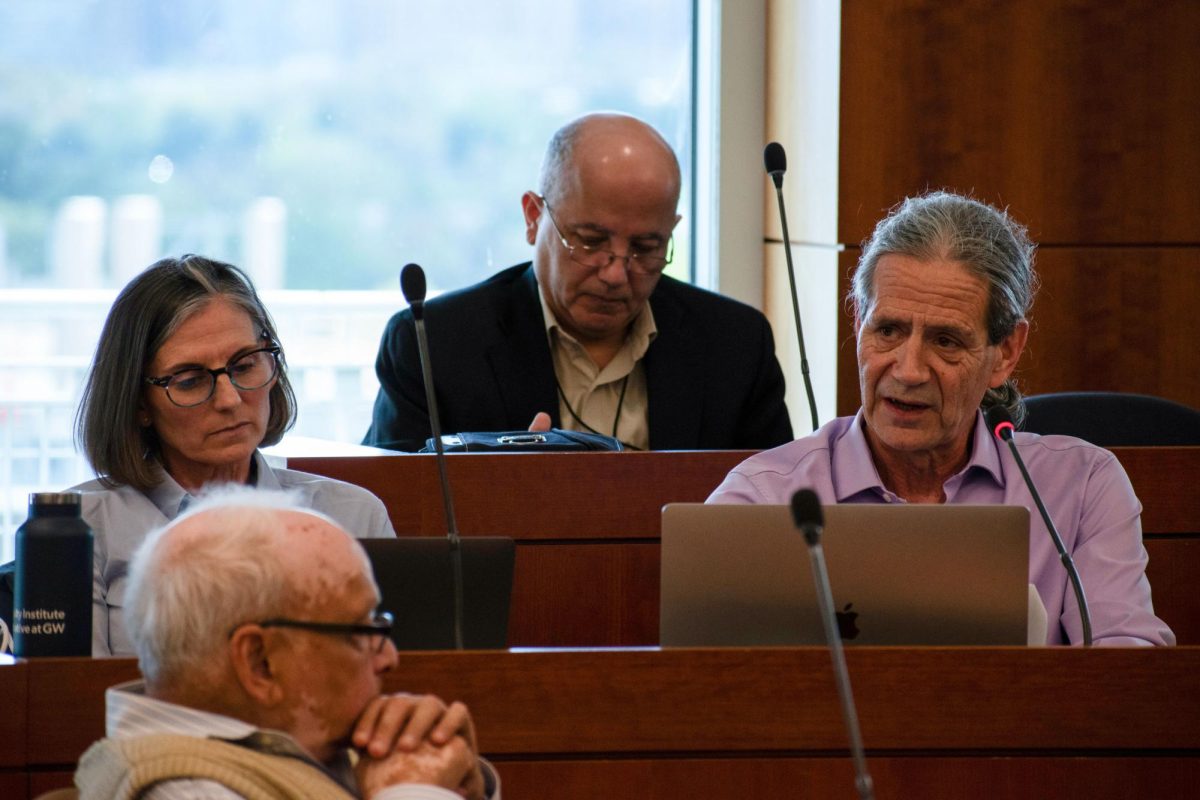Updated: Oct. 11, 2021 at 2:48 p.m.
Officials are launching a “focused initiative” to make GW more affordable for Pell-eligible students with scholarships and fellowships implemented over the next several years.
Donna Arbide, the vice president for development and alumni relations, said officials launched a fundraising initiative earlier this month to increase the financial aid budget for Pell-eligible students by roughly $2 million each year to fund need-based grants, loans and work-study packages. She said officials planned in February 2019 to announce a full fundraising campaign around GW’s bicentennial celebrations but deferred those plans because of limited alumni relations staff, the COVID-19 pandemic and incoming changes to University leadership.
She said officials are delaying the implementation and development of a major fundraising campaign until GW establishes a strategic plan and vision that can align with the campaign. Officials paused the formation of GW’s next strategic plan when the pandemic hit.
“That’s the hope, is that it would be part of one of the pillars of a comprehensive campaign,” Arbide said in an interview.
Arbide said the initiative – called “Open Doors: The Centuries Initiative for Scholarships and Fellowships” – fits under a new, broader commitment to make GW more affordable for low-income students.
“Having a strategic plan drives all parts of the business, enrollment management, fundraising, academic priorities,” she said. “So it’s something that we all need to join in and agree on and start the build. So I’m definitely going to be a strong partner in this for sure, so that we can get ready to launch a major campaign and storytelling initiative.”
The new fundraising commitment comes as the University reshuffles its administration. Mark Wrighton is set to replace University President Thomas LeBlanc on Jan. 1, and Interim Provost Chris Bracey stepped up this summer to replace Brian Blake, who departed the University in June.
“The increase in the financial aid budget is initially being funded by the University and recent philanthropic gifts, with hopes that philanthropy will be the principal funding source long term,” officials said in a release earlier this month.
A University spokesperson declined to say how long the Open Doors initiative will be in place and how much money officials have provided in direct financial grants to Pell-eligible undergraduates in recent years. She also declined to say the size of the current financial aid budget for students eligible for Pell grants.
Arbide said she plans to work with the deans, provost and other University leaders to conduct outreach for alumni and expand the University’s donor base. She said officials didn’t implement any layoffs in her department but kept positions open for nearly 70 staff members after they retired or left to work at other organizations last year as part of efforts to mitigate the financial impact of the pandemic.
“As positions came open, we just didn’t fill them so that we didn’t have to lay anyone off,” she said. “So that was a good part of what we did is that we just mitigated through open positions, and now we’re starting to prioritize and refill those positions now.”
Arbide said a major fundraising campaign would also require a staffing increase. She said officials are working to rehire staff members in the Division of Development and Alumni Relations as the University continues to emerge from the pandemic.
The University celebrated the completion of its last major fundraising campaign in May 2017 under former University President Steven Knapp, a drive that raised $1 billion from alumni and community member donations for student scholarships and new faculty after publicly launching in fiscal year 2012.
After officials announced the fundraising campaign set for GW’s bicentennial, they began to set the groundwork for the initiative in November 2018 with outreach goals to reach 16,000 alumni donors, retain 64 percent of all donors and require each staff member to meet with 150 donors each year.
GW’s fundraising totals dropped by about 17 percent between FY 2019 and FY 2020 and have only recently started stabilizing with a slight increase from $102.5 million in FY 2020 to $105 million during FY 2021.
Experts in higher education said officials could struggle to advance the financial initiative under interim presidential leadership, but they should also focus on supporting those students with specialized advisers and Pell-eligible student support offices.
Richard Richardson, a professor emeritus of higher education at New York University, said interim leaders tend to have a limited role in long-term initiatives and strategic planning, which could make it difficult for officials to implement a new fundraising campaign.
“Some of the problems that the institution has had need to be addressed by perhaps some new ideas and new people, and the interim leaders may be the people who can do that,” Richardson said. “But interim leaders are really constrained in what they can do, so it seems to me pretty courageous of them to put out this idea at this point.”
Richardson said the size of the Pell grant award – which totaled $6,495 in 2021-22 award year – is unlikely to make a difference in GW’s accessibility to low-income students. He said officials should work “substantially” to ensure that the new initiative’s funding is comprehensive.
“It would not begin to cover the tuition and cost of attending an institution like GW,” he said.
Matt Diemer, a professor at the University of Michigan’s School of Education, said while the Open Doors initiative can help expand GW’s financial access for Pell-grant recipients, it may not cover the costs of all the services required to ensure a quality college experience.
“Pell grants are great, and nobody’s going to argue against them, but it’s not a silver bullet,” Diemer said. “Only increasing Pell grant support seems like it’s one step in the right direction, but it also needs to be accompanied with other supports – recognizing the culture of the campus, having student supporting offices, other kinds of things that are necessary to help students be successful.”
He added that the University could risk the retention of Pell-eligible students without additional assistance, like advisers and support offices.
“We’ve been down this road several times before, where the institution recruits diverse students and then doesn’t support them,” Diemer said. “Then the students aren’t successful and aren’t satisfied, and it’s kind of a lose-lose all around.”
Henry Smith, an alumnus and assistant professor of education at Johns Hopkins University, said the University’s ongoing leadership changes could also serve as an opportunity for officials to restart their fundraising efforts and take more drastic measures to aid students.
“I think it’s a time for leadership and the University to say, ‘Let’s talk about being bold and doing some things we might never do in another situation like this,’” Smith said. “This is a rare opportunity to do something like this.”
This post has been updated to clarify the following:
This post has been updated to clarify that officials publicly launched the University’s most recent major fundraising campaign in FY 2012. Officials had previously announced that they publicly launched the campaign in June 2014.








